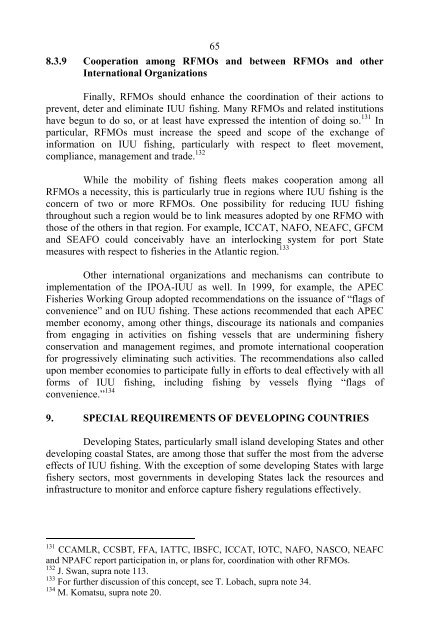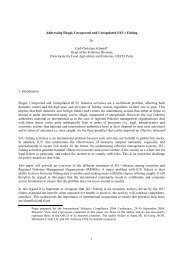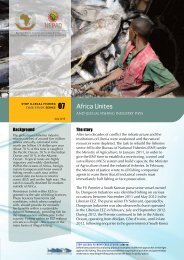Implementation of IPOA/IUU - International MCS Network
Implementation of IPOA/IUU - International MCS Network
Implementation of IPOA/IUU - International MCS Network
Create successful ePaper yourself
Turn your PDF publications into a flip-book with our unique Google optimized e-Paper software.
658.3.9 Cooperation among RFMOs and between RFMOs and other<strong>International</strong> OrganizationsFinally, RFMOs should enhance the coordination <strong>of</strong> their actions toprevent, deter and eliminate <strong>IUU</strong> fishing. Many RFMOs and related institutionshave begun to do so, or at least have expressed the intention <strong>of</strong> doing so. 131 Inparticular, RFMOs must increase the speed and scope <strong>of</strong> the exchange <strong>of</strong>information on <strong>IUU</strong> fishing, particularly with respect to fleet movement,compliance, management and trade. 132While the mobility <strong>of</strong> fishing fleets makes cooperation among allRFMOs a necessity, this is particularly true in regions where <strong>IUU</strong> fishing is theconcern <strong>of</strong> two or more RFMOs. One possibility for reducing <strong>IUU</strong> fishingthroughout such a region would be to link measures adopted by one RFMO withthose <strong>of</strong> the others in that region. For example, ICCAT, NAFO, NEAFC, GFCMand SEAFO could conceivably have an interlocking system for port Statemeasures with respect to fisheries in the Atlantic region. 133Other international organizations and mechanisms can contribute toimplementation <strong>of</strong> the <strong>IPOA</strong>-<strong>IUU</strong> as well. In 1999, for example, the APECFisheries Working Group adopted recommendations on the issuance <strong>of</strong> “flags <strong>of</strong>convenience” and on <strong>IUU</strong> fishing. These actions recommended that each APECmember economy, among other things, discourage its nationals and companiesfrom engaging in activities on fishing vessels that are undermining fisheryconservation and management regimes, and promote international cooperationfor progressively eliminating such activities. The recommendations also calledupon member economies to participate fully in efforts to deal effectively with allforms <strong>of</strong> <strong>IUU</strong> fishing, including fishing by vessels flying “flags <strong>of</strong>convenience.” 1349. SPECIAL REQUIREMENTS OF DEVELOPING COUNTRIESDeveloping States, particularly small island developing States and otherdeveloping coastal States, are among those that suffer the most from the adverseeffects <strong>of</strong> <strong>IUU</strong> fishing. With the exception <strong>of</strong> some developing States with largefishery sectors, most governments in developing States lack the resources andinfrastructure to monitor and enforce capture fishery regulations effectively.131 CCAMLR, CCSBT, FFA, IATTC, IBSFC, ICCAT, IOTC, NAFO, NASCO, NEAFCand NPAFC report participation in, or plans for, coordination with other RFMOs.132 J. Swan, supra note 113.133 For further discussion <strong>of</strong> this concept, see T. Lobach, supra note 34.134 M. Komatsu, supra note 20.
















